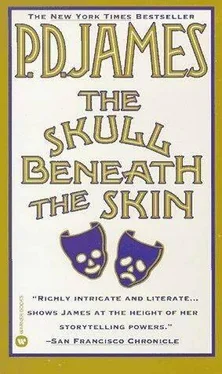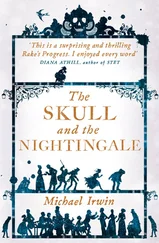P. James - The Skull Beneath The Skin
Здесь есть возможность читать онлайн «P. James - The Skull Beneath The Skin» весь текст электронной книги совершенно бесплатно (целиком полную версию без сокращений). В некоторых случаях можно слушать аудио, скачать через торрент в формате fb2 и присутствует краткое содержание. Жанр: Детектив, на английском языке. Описание произведения, (предисловие) а так же отзывы посетителей доступны на портале библиотеки ЛибКат.
- Название:The Skull Beneath The Skin
- Автор:
- Жанр:
- Год:неизвестен
- ISBN:нет данных
- Рейтинг книги:4 / 5. Голосов: 1
-
Избранное:Добавить в избранное
- Отзывы:
-
Ваша оценка:
- 80
- 1
- 2
- 3
- 4
- 5
The Skull Beneath The Skin: краткое содержание, описание и аннотация
Предлагаем к чтению аннотацию, описание, краткое содержание или предисловие (зависит от того, что написал сам автор книги «The Skull Beneath The Skin»). Если вы не нашли необходимую информацию о книге — напишите в комментариях, мы постараемся отыскать её.
The Skull Beneath The Skin — читать онлайн бесплатно полную книгу (весь текст) целиком
Ниже представлен текст книги, разбитый по страницам. Система сохранения места последней прочитанной страницы, позволяет с удобством читать онлайн бесплатно книгу «The Skull Beneath The Skin», без необходимости каждый раз заново искать на чём Вы остановились. Поставьте закладку, и сможете в любой момент перейти на страницу, на которой закончили чтение.
Интервал:
Закладка:
He turned quickly away and for a moment Cordelia thought that his eyes were moist. But then she saw that it was just a trick of the light and was embarrassed at her naivety. He might be remembering his own good chaps and the lost, forgotten and discredited causes for which they had died. But he was remembering without tears. He had seen so many bodies, so many deaths. Could any death now, she wondered, be more to him than a single statistic?
A door in the vestry led down to the crypt. To make their way down narrow stone steps lit by Ambrose's torch was to descend into a different world, a different time. Here alone was there any trace of the original Norman building. The roof was so low that Ivo, the tallest of them, could hardly stand upright, and the squat, heavy pillars strained as if bearing on their capitals the weight of nine centuries. Ambrose put out his hand to a wall switch and the claustrophobic chamber sprang into harsh unflattering light. They saw the skulls at once. One whole wall was patterned with them, a grinning parade of death. They had been ranged on rough oak shelves and were so tightly wedged that Cordelia judged that it would be impossible to separate them except by hacking them apart. Little care had been taken in the arrangement. In some places cement had been poured over them fixing mouth to mouth in the parody of a kiss. In others, the grit of the years had seeped between them binding them into cohesion; blocking the nasal cavities, collecting in the eye sockets and laying over the smooth domes a patina of dust like a shroud. Ambrose said'.
'There's a legend about them of course: there always is. In the seventeenth century the island was held by the de Courcy family; they had, in fact, been here since the fourteen hundreds. The de Courcy at that time was a particularly unpleasant representative of his breed. Someone must have told him about Tiberius' little doings on Capri – I don't suppose he could himself read – and he started to emulate them here. You can imagine the kind of thing; local maidens from the mainland abducted, droit de seigneur exercised on a scale which even the most compliant tenants found unreasonable, mutilated bodies brought in on the tide to the general disapproval of the locals. Speymouth was a small fishing village then. The town only reached any size or importance in the Regency – a sort of West Country Brighton. But the word got around. No one did anything, of course. The story is that the father of one of the abducted girls, whose tortured body floated ashore three weeks later, laid information against him with the local magistrate. De Courcy was subsequently tried at the Assizes but acquitted. One supposes it was managed in the usual way, a venal judge, perjured witnesses, bribed jurymen, a mixture of subservience and fear. And, of course, there was no direct evidence. At the end of the trial the father – he was an immensely powerful man according to the legend – rose up in court and cursed de Courcy and. all his clan in the customary dramatic terms of dead first-born, revolting diseases, the castle falling into ruins, the line extinct. Everyone must have enjoyed that part immensely. And then, in 1665 came the Plague.'
Cordelia thought that Ambrose's pause, if intended for dramatic effect, was unnecessary. The little group ranged round him were gazing at him with the rapt attention of foreign tourists whose guide, for once, is giving value for money. Ambrose went on.
'The Plague raged particularly fiercely on this coast. It was said to have been brought here by a family from Cheapside who had relations in the village and fled here for safety. One by one the local families fell victim. The parson and his family died early and there was no one to say the rites over the dead. Soon there was only one old man willing to bury them. Anarchy reigned. The island felt itself to be safe and de Courcy threatened death to anyone who landed. The story is that a boatload of women and children with one adult male to manage the boat did try. But if they were hoping to arouse de Courcy's compassion they were disappointed. He was behaving perfectly reasonably in this instance, of course. The only way to escape the pestilence was quarantine. It wasn't quite as reasonable to drive holes in the planks in the bottom of the boat before forcing it out to sea so that the human cargo drowned before they could reach shore, but that may be only a gloss on the story. About those
seventeenth-century boat people, I think we ought to give him the benefit of the doubt… And now for the climax.'
Ivo murmured:
'This story has everything but costumes by Motley and incidental music by Menotti.' But Cordelia saw that he was as interested as any of them.
'I don't know whether you know about the bubonic plague, the symptoms I mean. The victims would first have the sensation that they could smell rotting apples. After that came the dreaded pink rash on the forehead. The day came when the father of the murdered girl smelt the smell, saw in his glass the mark of death. It was a summer night but unruly, the sea turbulent. He knew that he hadn't long to live, the Plague killed swiftly. He launched his boat and set sail for the island.
'De Courcy and his private court were at dinner when the door of the great hall opened and he appeared, his great shambling sea-drenched figure, stumbling towards his enemy, eyes blazing. There was a moment when they were all too astounded for action. And in that moment he reached de Courcy, flung his great arms around him and kissed him full on the mouth.'
No one spoke. Cordelia wondered whether they would break into polite applause. The story had been well told and it had, in its simplicity, its terror, its almost symbolic confrontation of innocence with evil, a remarkable power. Ivo said:
'That story would make an opera. You've got the scenario. All you need is a Verdi or a second Benjamin Britten.'
Roma Lisle, gazing at the skulls in fascinated distaste, asked: 'And did the curse come true?'
'Oh yes. De Courcy and all his people here caught the Plague and were wiped out. The line is now extinct. It was four years before anyone came here to bury them. But then a kind of superstitious awe surrounded the island. The landsfolk averted their eyes from it. Fishermen, remembering the old religion, crossed themselves when they sailed in its shadow. The castle crumbled. It remained a ruin until my great-grandfather bought the place in 1864, built himself a castle in the modern style, reclaimed the land, cleared the undergrowth. Only the ruins of the old Church remained standing. De Courcy and his islanders hadn't been buried in the churchyard. The locals hadn't thought that they merited Christian burial. As a result Herbert Gorringe kept turning up the skeletons when planting his pleasure garden. His men collected the skulls and arranged them here, a nice compromise between Christian disposal and tossing them on the bonfire.'
Roma said:
'There's something carved above the top shelf, words and numbers. The carving's a bit crude. It could be a biblical reference.'
'Ah, that's a personal comment by one of the Victorian workmen who thought that the setting up of this row of Yoricks might be an opportunity to point a moral and adorn a tale. No, I shan't identify it for you. Look it up for yourselves.'
Cordelia didn't need to look it up. A convent-born knowledge of the Old Testament and a lucky guess led her unerringly to the text.
'Judgement is mine saith the Lord. I will repay.'
It was, she thought, an inappropriate comment on a vengeance which, if Ambrose's story were true, had been so singularly, so satisfyingly human.
It was very cold in the crypt. Conversation had died. They stood in a ring looking at the row of skulls as if these smooth domes of bone, the ragged nasal orifices, the gaping sockets, could be made to yield the secret of their deaths. How unfrightening they were, thought Cordelia, these age-long symbols of mortality, set up like a row of grinning devils to frighten children at a fairground and, in their denuded anonymity, stripping human pretensions to the risible evidence that what lasted longest in man were his teeth.
Читать дальшеИнтервал:
Закладка:
Похожие книги на «The Skull Beneath The Skin»
Представляем Вашему вниманию похожие книги на «The Skull Beneath The Skin» списком для выбора. Мы отобрали схожую по названию и смыслу литературу в надежде предоставить читателям больше вариантов отыскать новые, интересные, ещё непрочитанные произведения.
Обсуждение, отзывы о книге «The Skull Beneath The Skin» и просто собственные мнения читателей. Оставьте ваши комментарии, напишите, что Вы думаете о произведении, его смысле или главных героях. Укажите что конкретно понравилось, а что нет, и почему Вы так считаете.












